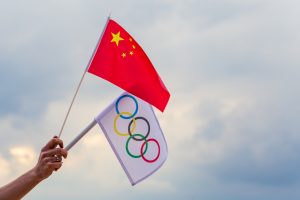Last week, Paris kicked off the 2024 Summer Olympics with a rain-soaked but dazzling opening ceremony. Since their inception more than a century ago, the modern Olympic Games have become one of the world’s most popular sports and entertainment events. They are especially important in China, where the accumulation of Olympic medals by Chinese athletes is closely tied to a sense of national strength.
This year, however, many Chinese internet users are expressing lukewarm feelings about the Paris Games.
One netizen wrote: “Southern and northern China are experiencing floods. The disasters are serious. Even living is a problem, who has the energy to pay excessive attention to the Olympics?” Another asked sarcastically, “If China wins 100 gold medals, can [the authorities] return my confiscated moped?”
Some users questioned whether the government should be spending its money on the Olympics. For this year’s games, the Chinese government sent a massive delegation of 716 people to Paris. “Excuse me, but how does footing the bill for their airfare, hotels, and travel benefit us taxpayers?” one asked.
The public skepticism likely has little to do with any diminishing interest in the sports programs themselves. It speaks more to the fact that many in China are facing hardship in their daily lives and therefore resent the government for spending lavishly on vanity projects such as the Olympics, rather than responding to citizens’ urgent needs, such as food safety, health care, and employment.
A major news development in China last month concerned a report that a large state-owned food company, in order to cut costs, was using the same tankers to carry cooking oil and fuel. The allegation sparked national outrage, intensifying a long-standing grievance among the Chinese populace regarding food safety. “[I]’ve heard the Olympics have started, but I have no interest in turning on the TV… [I] now only care about whether there is toxic coal in cooking oil,” a netizen declared.
Discontent resulting from a faltering economy is growing as well. Freedom House’s China Dissent Monitor shows that protests increased over the course of 2023, with economic issues – especially the housing market collapse – accounting for some 80 percent of all recorded dissent events.
There are also calls for netizens not to let the Olympics distract them from social problems. Xianzi, the women’s rights activist who rose to prominence after suing a celebrity anchor at the state broadcaster for sexual harassment, urged users to keep focusing their attention on an ongoing campus sexual harassment scandal. A few days earlier, a student at a top university had posted a video online in which she accused her dissertation adviser of sexual harassment. The video went viral, compelling the university to fire the professor immediately. This was an unusually swift victory in a country where perpetrators of sexual harassment, especially those in positions of power, are rarely held accountable at all.
Online attention has become a precious resource for social justice causes in China. President Xi Jinping’s increasingly repressive regime has steadily closed off the avenues through which citizens could air their grievances and seek redress, prompting more and more individuals to appeal directly to the online public in the hope that a viral post might generate pressure on the authorities.
There has been some genuinely positive online chatter about the Olympics this year, but official censorship has curbed its spread. For example, Chinese feminists praised the opening ceremony for celebrating 10 French female icons, such as philosopher Simone de Beauvoir and political activist Louise Michel. A number of netizens then complained that videos and photos about the women were being removed from their social media.
Patriotism is woven into the fabric of the Olympic Games, and the ruling Chinese Communist Party has long utilized it deftly to drum up support for the regime. Sixteen years ago, the 2008 Summer Olympics in Beijing, now often referred to as China’s “coming-out party,” showcased China to the world as a political, economic, and cultural superpower on the rise. Known for their extravagance, the 2008 games have continued to serve as a source of immense national pride.
But the Communist Party’s sports-nationalism playbook might be losing its potency along with the economy, as citizens’ immediate needs go unaddressed. However much the Chinese people love their country, no amount of gold medals can convince them to love a government that denies their basic desire for freedom and dignity.

































